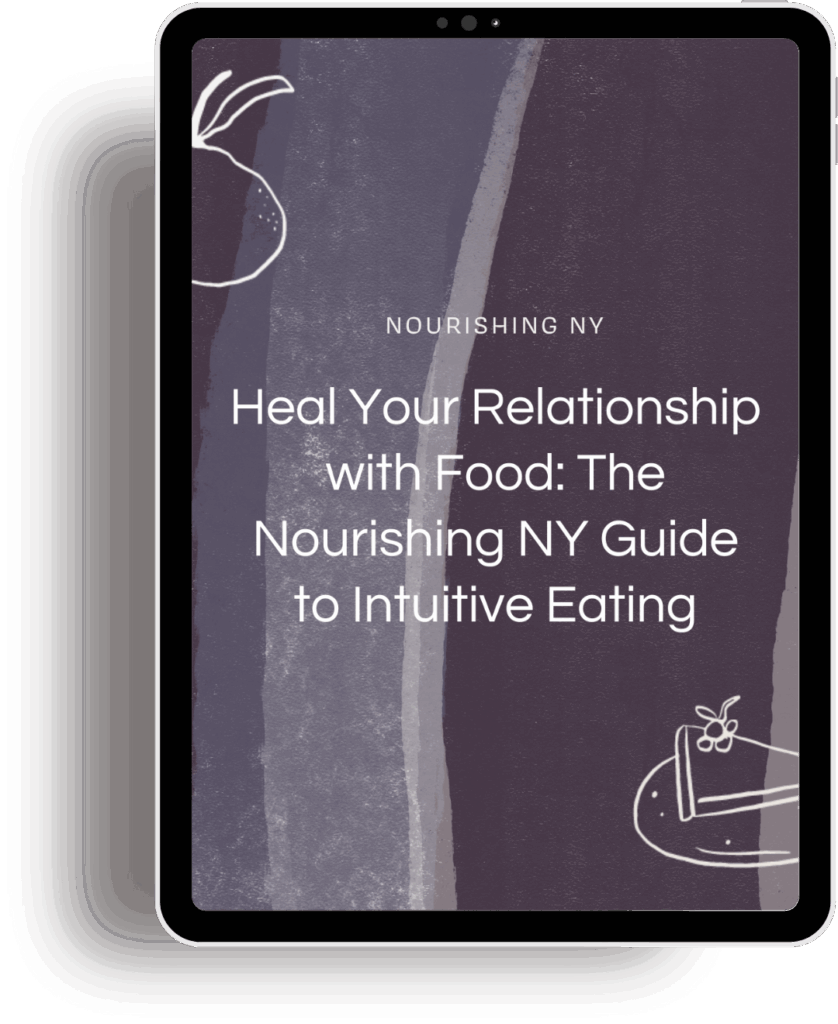The holidays can be a time filled with excitement, joy, and quality time. However, it can also be an overwhelming time for someone struggling with an eating disorder. The abundance of food, pressure to participate in family traditions, and overall changes in daily routine can contribute to heightened stress and anxiety. Combined, these stressors can impact one’s ability to listen to their body’s needs and might lead to an increased reliance on disordered behaviors to cope with the overwhelm.
Focusing on adequate nourishment and practicing flexibility can be essential strategies to navigate the holiday season. Incorporating meals and snacks that are filled with a variety of nutrients can be a helpful way to ensure balance without rigidity. Seeking support from an experienced eating disorder dietitian in NYC can make a significant difference during this time and can provide personalized strategies to support well-being. For those in search of expert guidance, a professional NYC dietitian can offer practical and compassionate advice tailored to your needs.
Why Balance Matters During the Holidays
The term “balance” is often used to describe the food on our plates or the nutrients in a meal, but it can also apply to nurturing our mental and emotional well-being. During the always-busy time of the holiday season, it’s essential to carve out moments for ourselves to recharge and regulate.
Finding balance in our approach to meals and eating during the holidays is vital. Given the pervasive nature of food during the holiday season, we tend to hear more conversations about “saving room” and “indulging” – behaviors that can often lead to a binge-restrict cycle. This cycle can disrupt one’s interoceptive cues – our ability to notice and respond to hunger and fullness cues. This cycle may lead to undereating with increased hunger later on, which can feel dysregulating for some. Incorporating balance or an “all foods fit” approach can be crucial to avoid such a cycle.
Additionally, food rules often surface during the holidays – particularly around desserts or meal timing – which can heighten anxiety about food and disrupt the ability to honor true cravings, as well as hunger and fullness cues. For instance, the pressure to avoid certain “indulgent” foods or to adhere to a strict eating schedule can lead to feelings of guilt or shame. This may further lead to disconnection from one’s body and contribute to patterns of restricting and bingeing. Consulting with an eating disorder dietitian or NYC nutrition expert can offer invaluable support, helping to work through these challenges and manage any eating disorder urges that may arise.
Practical Nutrition Tips for Healthy Meals
In order to maintain consistency during the holidays and prioritize adequate nourishment, here are several practical tips:
-
Ensure regular eating throughout the day. This could look like having three meals and two-three snacks in consistent intervals.
-
Ensure that each meal has a variety of nutrients (ex: carbohydrates, proteins, fats, and fruits or vegetables) to promote satiety and satisfaction.
-
Include fun foods and desserts alongside your meals and snacks to avoid restriction.
-
Incorporate mindfulness, such as pacing and checking in with how the food feels, as well as listening to your body’s cues.
-
Avoid delayed eating or “saving room” if meal timings are different (i.e. if dinner is earlier than usual, aim to have proper meals prior to avoid under-eating).
-
Plate your meals and snacks, rather than grazing, to avoid feeling overwhelmed with buffet-style or family-style meals.
Handling Emotional and Social Challenges
Though being with family can feel enjoyable and exciting, there are often unique dynamics that emerge. For some, this could include family tensions or family conflict. When this happens, our anxiety and stress may be heightened, which in turn could impact hunger and fullness cues. Discussions around dieting and “indulging” during the holidays can also be emotionally triggering, as well as the pressure to exercise to “earn” a meal or dessert. This might increase urges to restrict or feel the need to compensate during the day.
Others may experience societal pressures or cultural norms, such as participating in cooking or feeling obligated to attend social events. This might feel emotionally taxing for some individuals and can further decrease the ability to emotionally regulate. Taking time for oneself and maintaining self-care can be a positive way to navigate these pressures.
Aim to focus on connections at gatherings during the holidays, if the focus on food feels too overwhelming. Engaging in conversations, playing games, or watching your favorite holiday movies can all be ways to enjoy family quality time. Furthermore, working with a professional NYC dietitian can be a highly beneficial way to guide individuals through these complex feelings and circumstances.
How an Eating Disorder Dietitian in NYC Can Help
Consulting with an eating disorder dietitian during the holiday season offers numerous benefits, including personalized meal planning, effective stress management, and personalized coping strategies. An eating disorder dietitian can provide individualized support to help you manage the unique challenges of this time of year. Together, you might create a collaborative meal plan to promote consistent and balanced eating, identify self-care practices to manage increased anxiety, and explore underlying beliefs and emotions about food. Working with a NYC nutrition expert helps you navigate the holidays with confidence and self-compassion.
Prioritizing Self-Care During the Holidays
Scheduling in time for self-care can be a crucial way to manage the busy and chaotic nature of the holiday season. Helpful self-care strategies include:
-
Scheduling time for relaxation or meditation: Build in time during your day to do your favorite relaxation techniques, such as reading a book, deep breaths, watching your favorite show, doing a puzzle, or calling a friend.
-
Checking in with a NYC dietitian expert for encouragement and accountability: Meeting with an eating disorder dietitian regularly for support can be a great way to ensure that you are taking care of yourself.
-
Creating boundaries around food and weight conversations: Change the subject or leave a conversation that feels uncomfortable; listening to your own body’s needs, and honoring them, even if that might be different from those around you; eating consistently to avoid under-eating.
-
It’s highly achievable to find balance during the holidays and to take care of yourself, especially with the support of an eating disorder dietitian who can offer realistic tools and strategies.



